“How do you homestead with kids?” This question seems to resurface every couple of months in my email and on social media.
This particular question always leaves me scratching my head a little bit, because I am never exactly sure how to answer. I have spent some time recently thinking about our homesteading with kids, theories, and philosophies; (which may be slightly controversial) to try and give everyone an answer.
For me and Christian, the children were a really big motivator for getting into the homesteading lifestyle back when we bought our property. I wasn’t even pregnant yet; we were just a year into marriage and kids felt kind of far off down the road. However, we knew even then that our land, property, and plans were something we wanted to be a part of the legacy that we would give to our children.
A big piece of that way back in the beginning was that Christian and I were raised in town and we both always had this longing for the rural lifestyle. We wanted to give that to our kids, which goes back to the a familiar saying of something like “You often want to give your kids what you never had”. We just hoped that they would appreciate the homestead lifestyle in the process.
From day one, we knew that we wanted our children to be a big part of what we were doing and that has really held true.
Do you prefer listening to podcasts? You can listen to this article in podcast-form below:
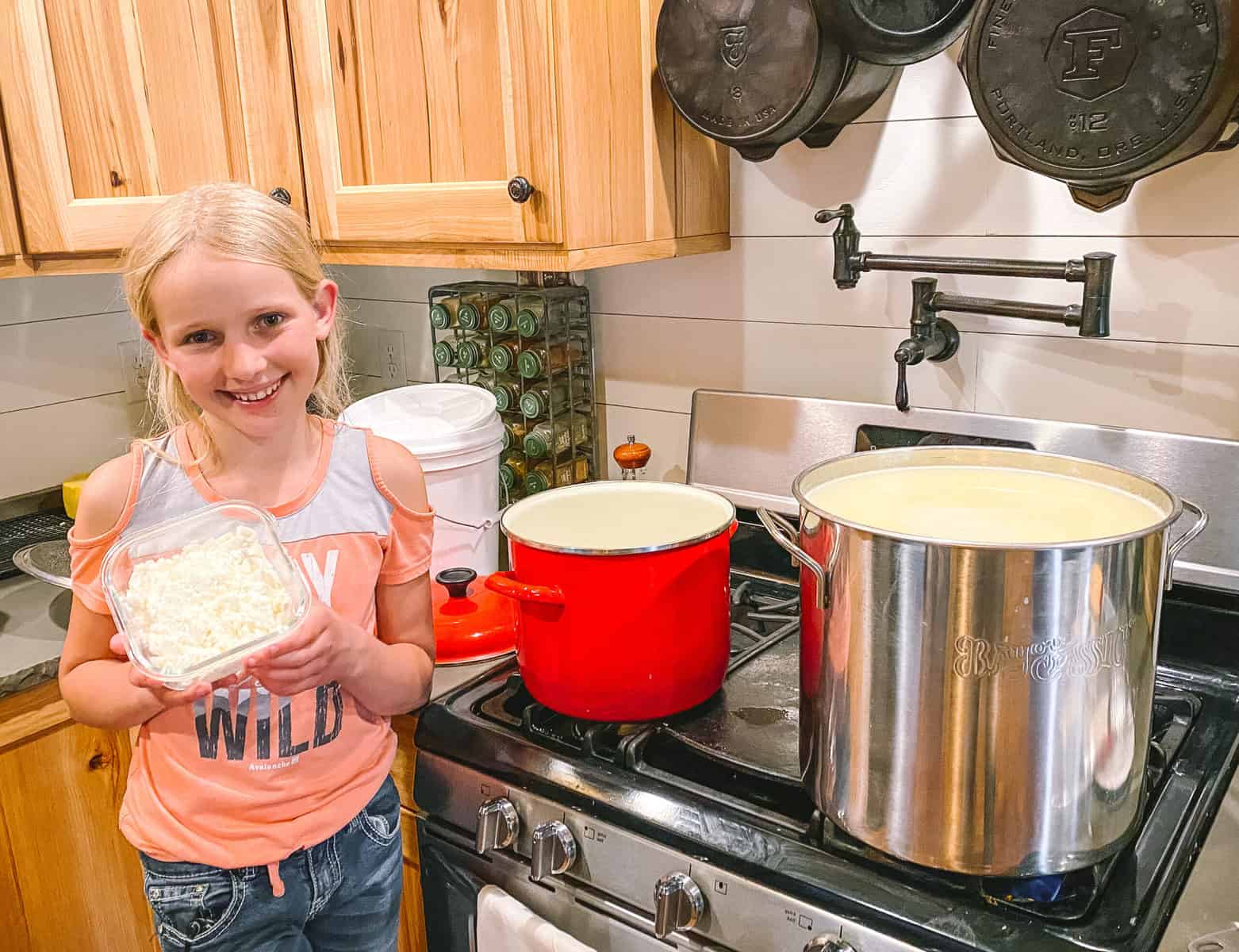
Our Beginning Homesteading With Kids
Mesa, our firstborn, literally on the day we brought her home from the hospital, we took her out to the barn and introduced her to the animals. Looking back now, that probably doesn’t seem like a very first-time parent thing to do. But for whatever reason, we took her out to the barn, and then she was out there with us really from that point forward.
We had dairy goats that were kidding when she was a newborn, and I had my horses that I was working, and she was just coming along for the ride. We put her either in her car seat, a stroller, or in a front pack, she took naps out in the barn, and I would nurse her wherever I could find a bucket to sit down on. That was her reality from newborn until now, and so when our second and third-born kids came along, they just rolled into that same routine.
Raising our old-fashioned kids means that they have been very much exposed to animals, dirt, manure, soil, and vegetables since they could walk. Which of course means they have eaten a lot of dirt (and occasionally probably a little bit of poop), but my theory is it just makes their immune systems more robust.
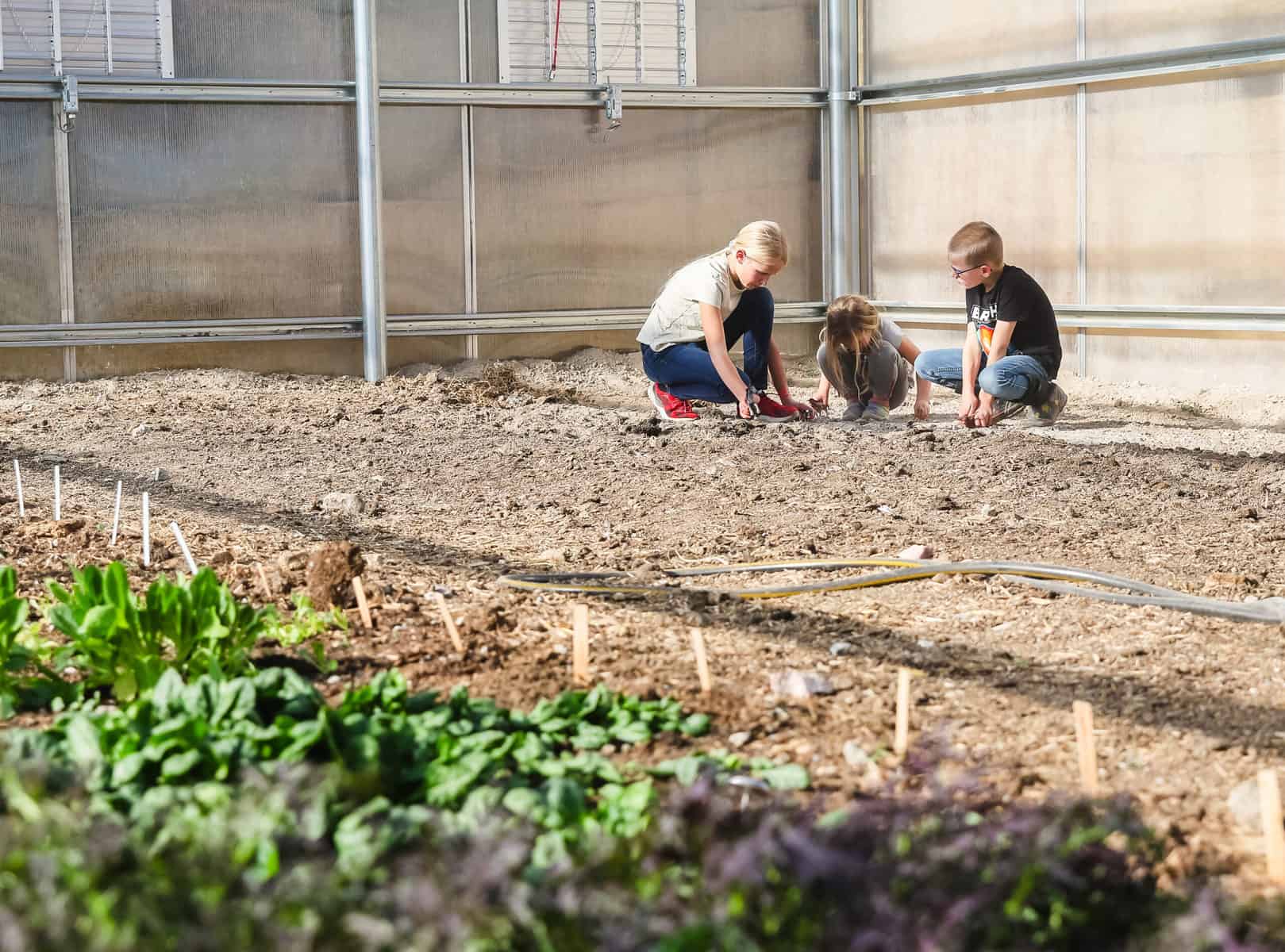
Note: Our Way Isn’t the Only Way to Homestead with Kids
At the end of the day, we don’t know anything different. We don’t know what it’s like to homestead without kids.
Having your first child in the middle of homesteading or moving your children to a new homestead property can feel a little bit foreign. With either situation, I understand the concern of not knowing how it’s all going to work.
Christian and I have our parenting philosophy that has made running a homestead and several businesses possible, all while homesteading with kids. I will admit there is some chaos at times, but there is also a specific kind of mindset (more about that below). This mindset and the way we have approached homesteading with kids has made all the difference.
Before breaking down mine and Christian’s parenting philosophy, I’ll be honest, I have been hesitant to dive into this topic because I haven’t wanted to offend anyone. As my children get older and I have been around different parenting styles, it has become more apparent that our philosophy is uniquely old–fashioned.
I do understand that what I am about to explain could feel a bit offensive and strange. It is not my intent to cast judgment on anyone’s parenting style and I am not saying our way is the only way. I would like you to understand that this is something I feel strongly about and for us, this is what works.
There are plenty of different ways to raise and homestead with kids, but this is our way. Watching our children grow and seeing how they’re progressing has made me extremely happy with the results that have come from this philosophy.

Homesteading With Kids: Our Way
Here we go…
The biggest thing that we have done that has enabled us to homestead, run businesses, and have children is that we have never taken the mentality that our life revolves around our children. In today’s parenting climate, I know that this sounds slightly shocking and possibly disturbing.
Our children are very important to us: they are a priority and we do make many choices where our children are the primary factor. For example, we chose to homeschool our children, which is a sacrifice both time-wise and convenience-wise.
However, as adults, Christian and I have always maintained the idea that we still have a mission and purpose on this earth beyond just our children.
I know a lot of times it’s easy for parents to become very centered around a child; and everything becomes all about the child’s dreams, goals, and activities. We make sure our children have the resources, time, and focus for their dreams, but Christian and I still have our own. This is something that I have noticed is somewhat rare in parents, and for some parents, it is easy for their world to revolve around the child.
As parents, we generally don’t do that: we are on our own path; we are on our journey. Our children are invited to come along with us while they’re in our home and while they are under our care. Watching our kids, I truly believe that they enjoy being a part of something bigger.
With small children, it is my theory that being the center of the universe can be a little bit disorienting. At first, it might seem like the kids are fighting for that, but when they get there, it doesn’t feel good. When an 8-year-old becomes the center of their adult’s world, I feel that it breeds a lot of negativity, poor attitude, and insecurity in the child.
A lot of times, when the parents have had so much focus on a child for so long, the parent feels like they can’t have their own hobby, dream, or goal. We do have times where our life revolves around a child’s activity like, for example, when we had our first 4-H Fair experience a year ago. It was intense and our whole family revolved around the fair for that week, but it’s not like that all the time.
I want our children to know they are important in their value and that they are very much a priority in Christian and mine’s life. BUT they are expected to come along for the ride; we have things going on and we expect them to be a part of it.

Three Expectations to Have While Homesteading with Kids
1) Give Your Child Responsibilities or Farm Chores
When you first start this, you should plan that it will take more time to do the chores, especially if you have kids that are not super keen on the idea of chores, or if they are very young. You have to make sure they are not hurting themselves, feeding the animals the wrong food, or leaving the gate open while they do their jobs.
Giving your children responsibilities or farm chores does two things:
- It helps them feel like they’re a part of the bigger picture
- It also takes a load off of your responsibilities/time (sometimes a lot of a load off of you, especially as they get older).
Our oldest is ten and she is extremely useful, even as useful as an adult in some aspects. She does chores every morning, she handles the care of our horses, she milks her goat, and she has started taking over feeding our sourdough starter. She even helps sometimes with making some of the meals (like when she surprised me with breakfast on the table when we were having a bad morning start with the cows (watch the video here).
Our eight-year-old does all the chicken chores; sometimes there are days at a time where I don’t even go out to the chicken coop. He is getting the eggs, giving them water, and feeding them. Some days it’s not perfect and he forgets things, but we guide him through it.
Our children not only have ownership in this lifestyle, but it makes life easier for Christian and me to have our kids as helpful team members that are part of the game plan.
2) Teach Them That Being Uncomfortable Is Okay
Expect your kids to be uncomfortable sometimes and help them understand that being uncomfortable is not a death sentence. Our kids get cold when they go do chores in the morning and then they get hot during the summer if we’re out in the garden. They also get tired when we’re out stacking wood as a family, but I expect my kids to be okay with being uncomfortable.
None of us love being uncomfortable, otherwise it wouldn’t be called uncomfortable. As adults, I believe that how we react to being uncomfortable is an important trait. Some adults don’t know how to be uncomfortable, so I wanted my children from a very young age to know that it’s okay to be hot, cold, or sometimes tired. You will not die from being uncomfortable, and you will come out the other end and feel good about it.
This is something we have talked a lot about since the time they were toddlers. Explain what you are doing, and say things like ‘we’re going to stack firewood and it’s going to take a little while’. Tell your kids that it is a lot of work but when it is done, we’re going to come in and have a fire, yummy soup, and cookies for dessert. Let your kids know that when you are done, it is going to feel good because you pushed through the hard thing.
This is the narrative we have constantly in our house: “it’s hard, but you get to the other side and it feels good” or “if you’re cold, then you appreciate the hot fire in the woodstove that much more.”
I want them to be aware that you can be uncomfortable in your life. Of course, there is some whining that occurs, because they are still kids. There is “my hands are cold” or “I’m sweaty I don’t want to do this anymore,” but we work through those moments.
So far, I’ve been pretty darn proud watching them work through the uncomfortable moments and come out the other side (NOTE: before you get angry at me: there is a difference between ‘uncomfortable’ and dangerous. We aren’t forcing our kids in dangerous conditions, like super cold or hot temps where frostbite or overheating are actual concerns).
3) Expect Your Kids to Entertain Themselves
Expect your kids to entertain themselves. This is also something I don’t see happening a lot in today’s parenting culture. I will be honest: I didn’t start this plan because I had some grand aspiration of being a mom of the year, I started it because I’m selfish. I don’t have the ability or interest to sit on the floor 24 hours a day and entertain my children, nor do I think that it is good for them.
From the time my babies could sit up, l would put them on the floor in a safe place with pillows around them and toys to play with. Of course, they ate with me and they had cuddle time with me, so they felt like they were connected to me, and they know mom is there when they need me.
But I would also say “here is your time to play and explore on the floor. Mommy’s going to go over here, you will be fine, you can hear me, and you can see me from a distance.” I expected them to entertain themselves, and it honestly didn’t take a lot for them to learn how to do that. They had things in front of them that were interesting, and they wanted to explore.
We have built on this way of thinking as they’ve grown and I now have a ten, eight, and five-year-old that can entertain themselves really well. They love it, we get done with our homeschool or whatever we’re working on in the mornings and they are like “see ya Mom, I’m off”. They are off with a plan, and they already know which toys they are going to play with and what activities they want to do outside. This is their time, and they entertain themselves and enjoy it.
People ask “how do you cook, work on your businesses or work in your garden when you have kids in the house?”. Honestly, at this point in our life, homesteading with kids feels pretty easy because they do so much happily on their own.
Of course, there are of always exceptions. Smaller kids can be more of a challenge, but there are some tricks to getting things done. One thing that I figured out when my children were small was a fly net and an old playpen.
It has been a while since I bought a fly net, but they were available for purchase online when my kids were small. It is a cover made to go over the top of playpens or strollers and was a godsent. I bought a couple of those, and I would stick the kids in the shady barn during the summer while I was riding my horse nearby or cleaning livestock pens. The net over the top of the playpen would prevent the flies from bothering them while they napped, and I got things done.
For the most part, my kids do their own thing and they love immersing themselves in whatever they are doing. There is also a time and place when the kids are with us stacking firewood, helping me in the garden, or doing their chores.
We by no means make them work all day, there are times where I am like “go play.” Go be kids, take off your shoes and run around in the grass, eat some dirt, go do your thing. They are very happy and content doing that. I believe fostering the ability for your children to entertain themselves is absolutely crucial.
These are three things that we expect of our children and we hold them to this standard; it is what makes our parenting philosophy work. Keep in mind, of course that they are still children, so sometimes this philosophy works great, and sometimes it doesn’t. On the days those things seem to not be working, I am reminded that it is ok to fail and teaching our kids to fail is just as important as our expectations.
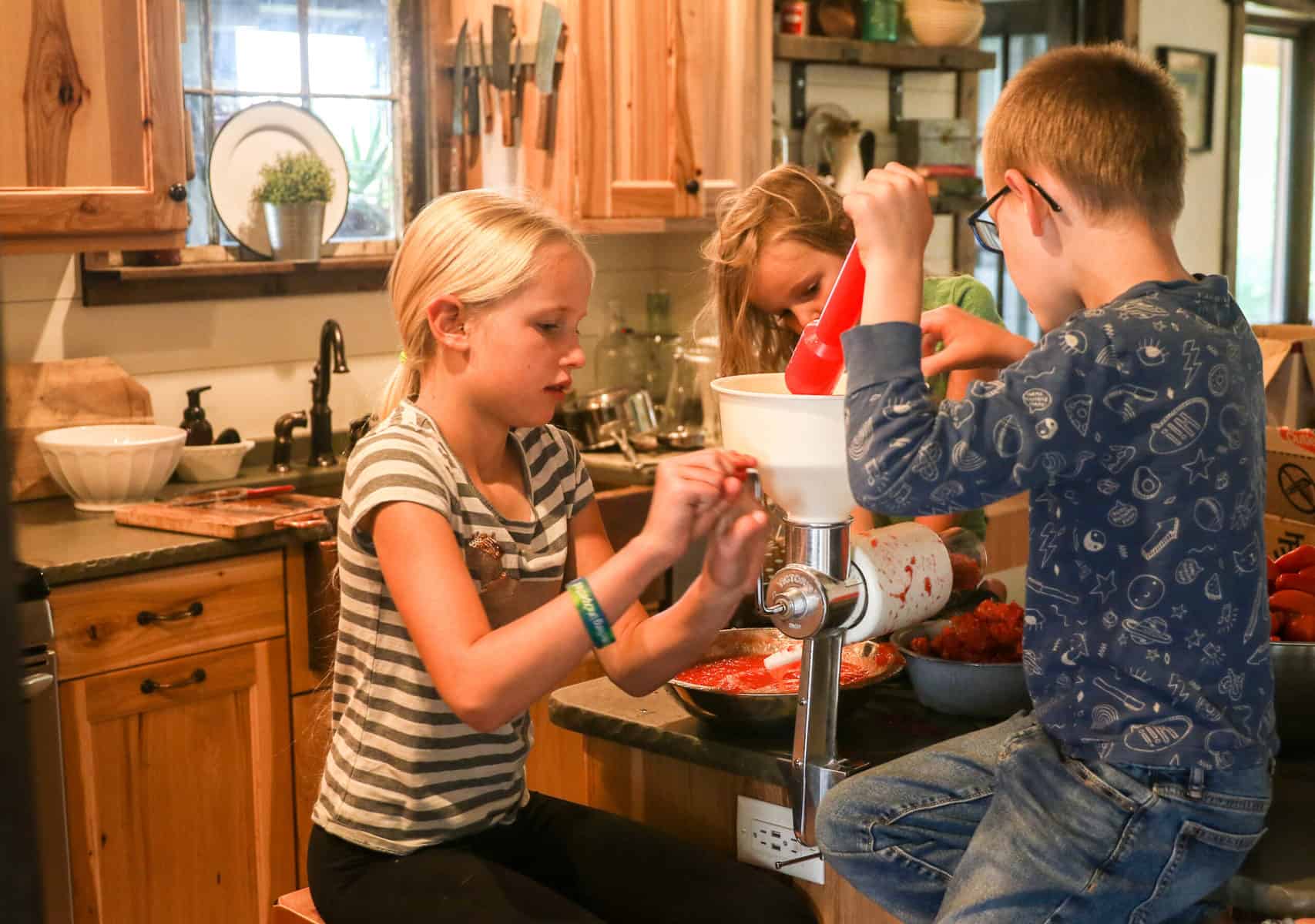
The Beauty Beyond Homesteading Expectations
It is important that your kids see this lifestyle as being sometimes uncomfortable, doing some hard work, and occasionally doing things we don’t want to. It is also equally important that they understand the beauty of it.
Starting at a young age, I have talked with my kids a lot about the wonders of this life. We have talked about the wonder of seeds growing, vegetables appearing, and how it’s ok to snack right from the garden. These are things that I get excited about and when I get excited, they get excited. The beautiful, amazing, miraculous parts of this lifestyle need to be talked about too.
I’ll bet a lot of kids will pick up on the beauty of it all, because children tend to have a beautiful way of viewing the world. When your children see an adult in their life embracing these things and celebrating them, it will make your children love it that much more.
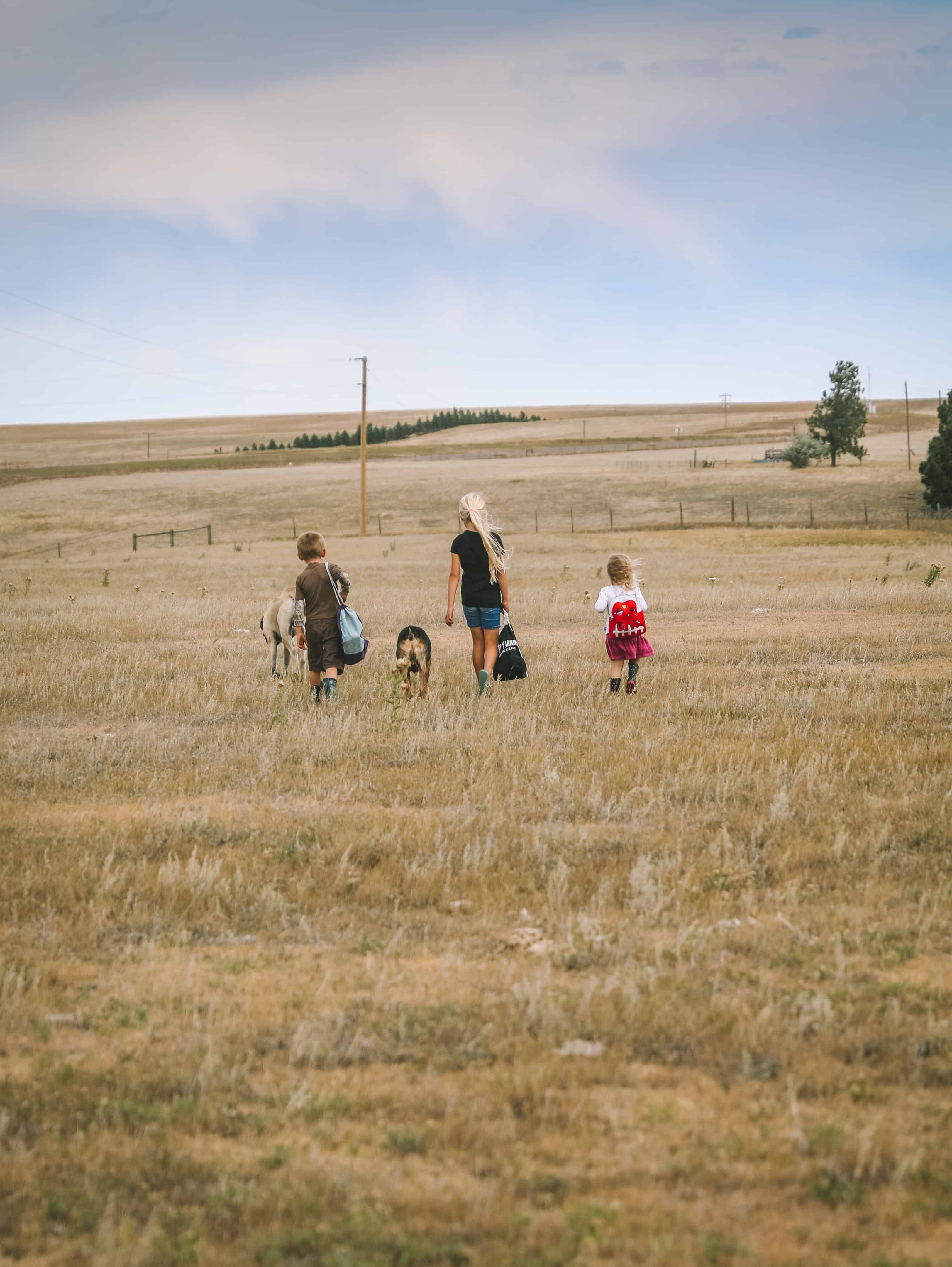
You Can Homestead with Kids Too!
Hopefully, my thoughts and our philosophy have given you some inspiration. Our way of doing things is not perfect, sometimes it works and sometimes it doesn’t. You might see pictures of us and the kids looking like we have created this blissful serene childhood, but it’s not always like that.
There are days when the kids fight a lot, I lose my temper, or something escapes, and these are the days when the homestead is teaching different lessons. Even with the ups and downs, looking at this lifestyle that we are building together, I can’t imagine a better way to raise your children.
If you are looking to move into the country with your family or you’re just looking to create more of an old-fashioned on-purpose lifestyle with your children, I believe it is so worth it. There will be tough days and there will be amazing days, but no matter what your children will have this incredible foundation for what’s to come as they grow and mature.
More About Homesteading with Kids:
- Will My Kids Fall Behind? (And Other Homeschooling Questions)
- 7 Lessons My Kids Have Learned From Homestead Life
- I’m Teaching My Kids to Fail
- Raising Old-Fashioned Kids in a High Tech World
- When She Leaves…(reflections on my eldest daughter)
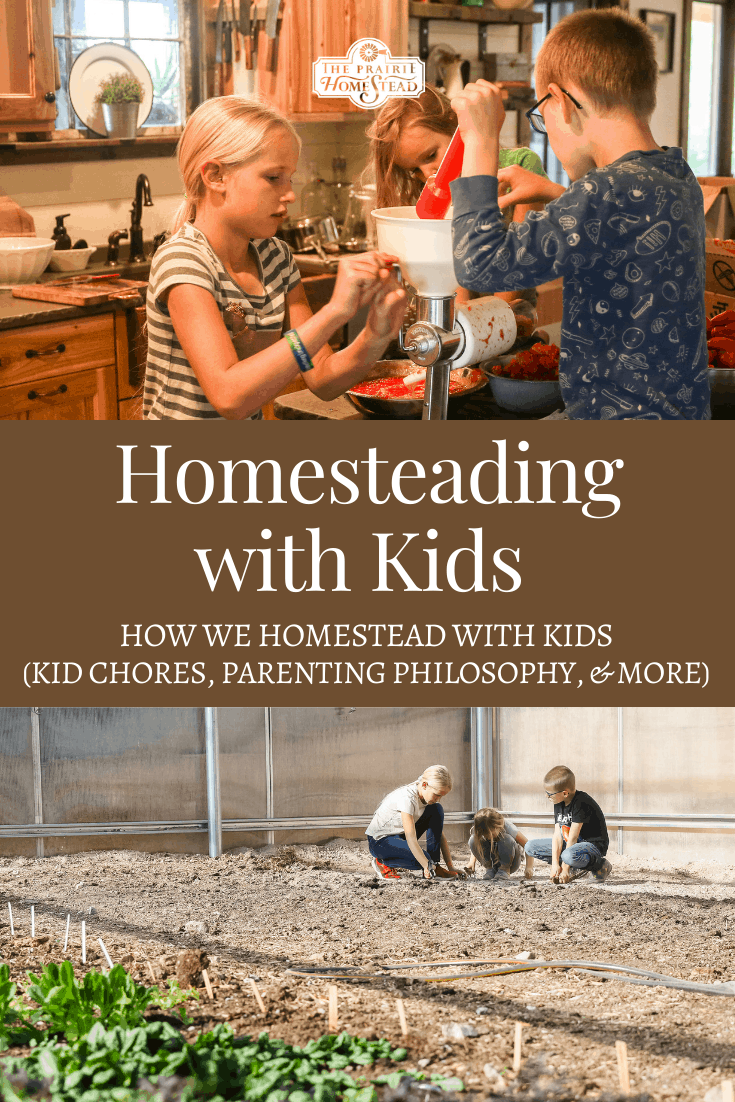
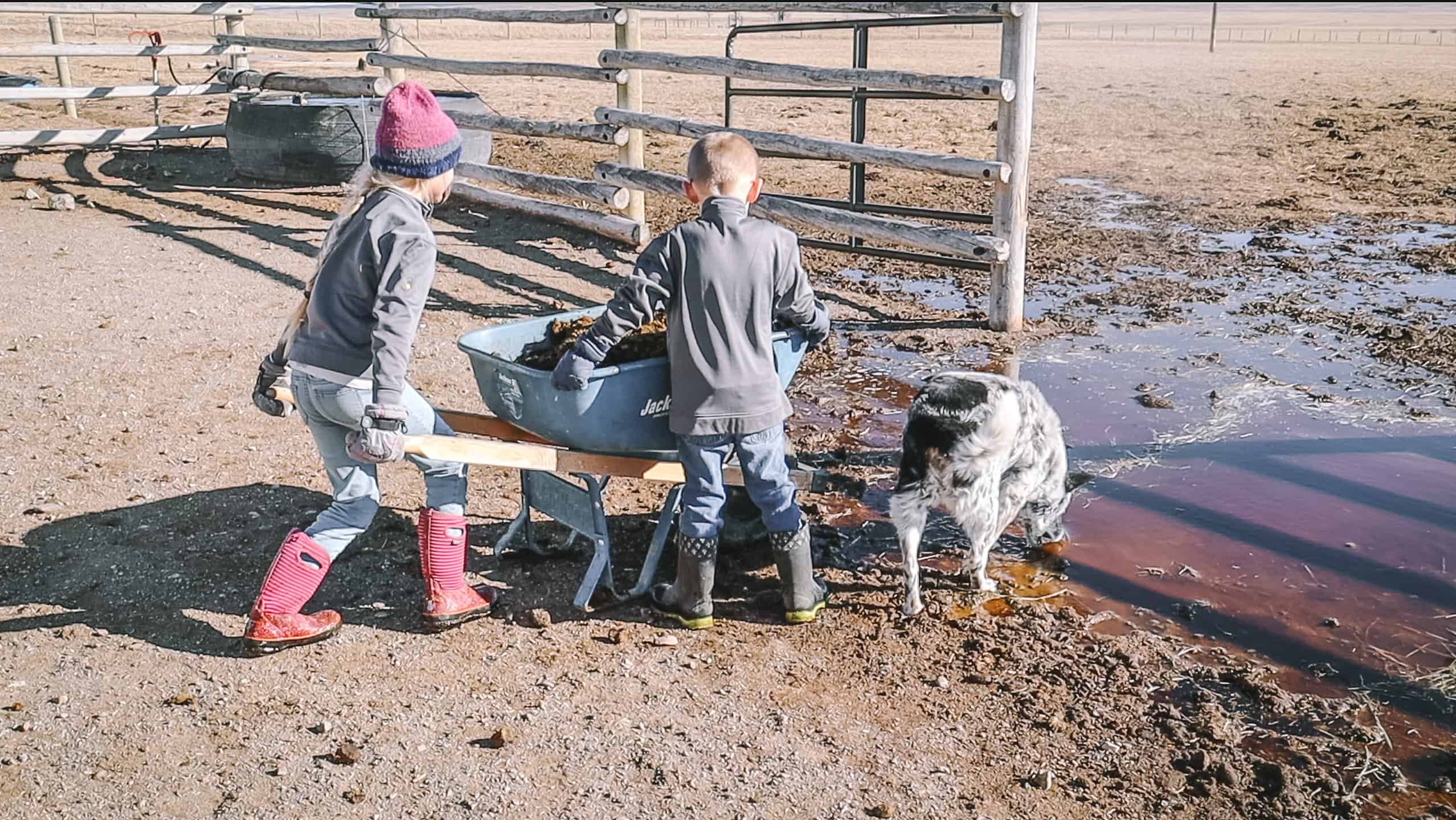


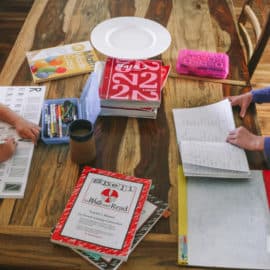
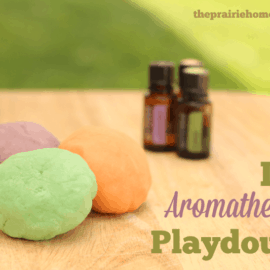
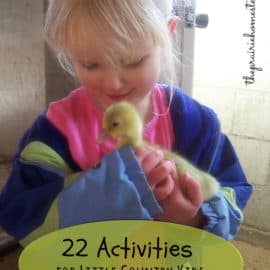
Excellent!
Children understanding the concept of personal responsibility, and the value of age appropriate chores, creates a sense of family value which in turn contributes 100 percent to their entire life!
Thanks for sharing this. It’s a philosophy that resonates very well with a higher Authority than our own (Deuteronomy 6:7)! My grandparents were bone fide homesteaders (think covered wagons, sod shanty, carving a homestead out of the Canadian wilderness, a farm which is still running and still in the family to this day). They raised 6 children on your type of principles plus one – “together we survive”. My mother left the farm for the African jungle and the Caribbean rainforests as a missionary. She raised 4 children on your principles and her parents principles, plus one -“whatsoever you do, do all to the glory of God”. We all not only survived in this world, we thrived. My uncles and aunts grew up to be able to do hard things, amazing things that changed peoples lives. We grandkids have grown up not afraid to carve out our place in this world with our hands, our hard work, and little else. Each in our own way are making a difference for good. Now I’m raising my 5 children on a farmstead, with the principles of my forebears plus one- “Arm yourself with tools for life, and learn to tell yourself what to do.” Well O.k. , that’s two! The point is, the philosophy you and your husband apply has a long history of success raising strong, independent, courageous, creative, useful, beautiful people able to navigate this life and leave the people and places they inhabit better for having been there. Press on!
Thank you for this affirming blog post. This us how we are raising our kids.
It’s extremely interesting that you worded so many things the way you did. I think we have a lot in common in our parenting practices, however I would say that the REASON I homestead, take the time to cook from scratch, teach my kids to be independent, homeschool, etc, is BECAUSE my kids are the center of my universe. I do it all for them.
I guess I would also disagree with you when you say that you have missions in life besides your children. I have never agreed with this sentiment. We live to follow Christ and raise children, that is all. That is our mission. Everything else we do is a nice bonus in my opinion.
To be honest when you said your views were old fashioned I thought you were going to say you believed in stay at home motherhood, I think that’s the true “old fashioned” parenting philosophy we have lost.
In addition I want to clarify; that I do not mean to say we can’t have hobbies and interests and goals. Rather that those things are not missions. And they are no where near as important of a priority as our children.
I agree wholeheartedly with you. Or is not good for kids to be the center of the world, instead you bring them along with you into making the world around them better!! I am on year 3 homeschooling and year 2 homesteading and I dream of being to where you are with your kids. Thank you so much for this! Super encouraging!!! You aren’t as rare as you might feel ?
Has it really been 5 years since your baby was born?!? I remember when you were expecting 🙂 I totally agree kids need more REAL life, not all the TV/video games/devices that they’re handed and love that you’ve taught yours to entertain themselves vs let a screen do like most parents nowadays. On getting kids to do chores and losing your temper, I highly highly recommend parenting expert Nicholeen Peck on her YouTube/books/blog/podcast. Teach your kids to govern themselves inside and out, and do it calmly and sanely.
Love your blog. So interesting to read about your lifestyle. I’ve often wondered what kind of wildlife is in your vicinity, such as bears, wolves, cougars etc. How do your kids react to seeing something wild especially if they are out doing chores alone. Maybe you have talked about this before and I missed it. I think you are doing a great job with your kids and homesteading. God bless you.
I love this! This is very similar to how my husband and I raise our children. Thank you for sharing! 🙂
Do you have any recommendations on children’s books that celebrate homestead/farmstead lifestyle with kids?
I have a 6yo and 8yo and we have recently added farmsteading to our homeachooling life but my kids are very resistant to the chores aspect of things. Thanks for your insights!
Wish I could call you on the phone! This blog post hit home today. My husband and I are moving our five kids onto some land to build a home and start our life debt free and self-substaining. We’ve slowly built up the skills over the years and are now diving in (scary as it may be). Explaining this to my sister she decided to tell me how worried she is about my kids asking “but is this their dream?” I said, this isn’t about what they want, it’s about what is best for the family… no one understands where we are coming from and no one understands us not catering to our kiddos. They are so important to us but God is first and my husband comes before my kids.
I agree, it’s so important for kids to feel uncomfortable at times and to work through those feelings. It’s too easy for them to just whine and try to get out of an uncomfortable feeling. But when they put up with it and get through it, they learn the fact that everything is temporary and that it will pass. And they come out stronger afterwards.
I got the, “Don’t whine,” treatment all the time as a child.
Turned out I had serious health problems – a rare and complex genetic condition (hEDS).
Stronger afterwards? On the contrary, massive further damage to my health.
It is easy for an adult to say a child is whining and that it would do them good to learn to put up with discomfort, because they are not experiencing what it’s actually like for the child. If they did realise they would probably be horrified.
I once reported to a lesson at school with one entire side of my body numb and on fire with pins-and-needles, unable to grip with one hand, having just thrown up, dealing a headache to fry eggs on, and suffering from firework-display disruption-of-my-vision, only to be told off in the most unpleasant fashion for malingering by the teacher when I said I wasn’t feeling well. I’d already struggled through several hours of lessons in that state without saying anything.
Thankfully, it was migraine, not stroke. But one of my classmates at one point (different school) literally had a stroke in front of the teacher and also just got told off.
That’s what an over-the-top “don’t whine” culture actually comes to in practice.
Of course, the operative words here, are, “over-the-top,” as it is always possible to go too far in both directions. But if the demands put on kids really are beyond their strength and are doing damage, it is important to realise it.